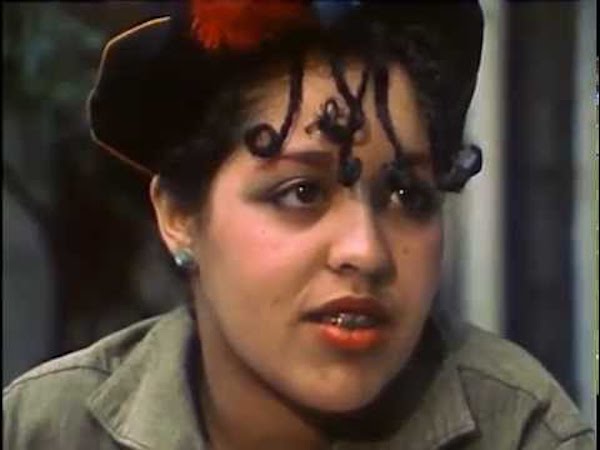Film Review: “Poly Styrene: I Am a Cliché” — Courage and Artistry Relevant to Our Moment
By Betsy Sherman
The documentary strikes a remarkably rich vein, covering not only music, fashion and a late-1970s social critique, but also matters of race, class, gender, mental health and spirituality.
Poly Styrene: I Am a Cliché – Directed by Celeste Bell and Paul Sng. Streaming as part of the Independent Film Festival Boston, available on May 13.

Poly Styrene on stage. Photo: Poly Styrene: I Am a Cliché
One of the unique voices of ‘70s British punk belonged to a Black teenage girl from the Brixton section of London. Poly Styrene (1957-2011) and the band she formed, X-Ray Spex, produced a primal wail in their classic 1977 single Oh Bondage Up Yours! As the band’s songwriter and frontperson, Poly — living up to the synthetic stuff of her alias — made pungent comments on the plastic, disposable nature of so much in everyday life, and of celebrity itself. X-Ray Spex were sadly short-lived, producing one great album before breaking up. Poly’s solo career fizzled, and then she seemed to disappear. Ten years ago the sad news broke of her death at age 53.
Poly’s daughter Celeste Bell has taken it upon herself to shine a light on her mother’s legacy, and fill in the story of those lost years. First came the 2019 book, co-written with Zoë Howe, Day Glo: The Poly Styrene Story. Now Celeste, with co-director Paul Sng and writer Howe, has made Poly Styrene: I Am a Cliché, centering on her relationship with her mother. The documentary strikes a remarkably rich vein, covering not only music, fashion and a late-1970s social critique, but also matters of race, class, gender, mental health and spirituality. As a double portrait of daughter and mother, it covers a range of emotions and concludes with a moving and poetic illustration of the women’s deep bond.
Poly was born Marion Elliott Said, to a white British mother and a Black Somali father; her dad wasn’t in her life for long. Poly’s sister Hazel describes the poverty in which the family lived, and the isolation of her mother, who was shunned by white neighbors for her choice of a husband. The girls were bullied for being mixed race. Poly’s poem Half Caste (the dismissive British term for bi-racial) describes her being chased by the racist National Front (her poems and diary entries are read by actress Ruth Negga). Celeste comments, “Her Britishness was always questioned.”
The girl had artistic ambitions, and guts. In spite of, or perhaps because she looked completely unlike young women on magazine covers and television, she set out to put herself in the public eye. Poly placed an ad in the music paper Melody Maker, seeking “young punx who want to stick it together.” X-Ray Spex was formed, in its early days including another female member, sax player Lora Logic.
Celeste, who narrates the film with additional comments made by Poly’s contemporaries and admirers, is shown poring over an archive full of punk treasures: photographs, DIY posters (Poly did the artwork for her projects as well as writing songs), clippings, handwritten lyric sheets and the thrift-store finds her mother wore. It wasn’t until five years after Poly’s death that Celeste felt able to cope with looking through her mum’s stuff.
The filmmakers make good use of home movies and performance footage, as well as clips from TV profiles of Poly. Pieces include an endearingly girlish 1977 interview where the braces-wearing singer, her eyebrows drawn in red, punctuates thoughts with grins and giggles. But she could also also be tough and sharp, speaking out about oppression (she said that Bondage was about more than sexual fetishism, it encompassed slavery and “a desire to be free from unwanted desires”).
The band’s album Germ Free Adolescents, its cover art trapping each of the five members in test tubes, stood apart from fellow Brit bands in terms of subject matter. Poly was skilled at weaving character voices into the lyrics, often taking an ironic stance (as in I Am a Cliché). One of her most powerful songs was Identity:
When you look in the mirror do you see yourself
Do you see yourself on the tv screen
Do you see yourself in the magazine
When you see yourself does it make you scream
Humor was very much part of her arsenal. In Plastic Bag she declaimed:
My mind is like a plastic bag
That corresponds to all those ads
It sucks up all the rubbish that is fed in through by ear
I eat Kleenex for breakfast
And use soft hygienic Weetabix to dry my tears.
Celeste comments that, although Poly’s songs critiqued consumerism, her mum was a shopaholic.
But for Poly, the high of success, which included an appearance on Top of the Pops, was accompanied by the physical pressures of touring and the psychic shocks caused by constant scrutiny of her looks (punk, like rock in general, was overwhelmingly male). A tipping point came when X-Ray Spex went to New York to play at the legendary club CBGB (Sonic Youth’s Thurston Moore gives his eyewitness account). The “negative energy” of the New York punk crowd, as well as a bad drug experience, are given as possible reasons why the trip, in the words of a bandmate, “destabilized” Poly. It’s also offered that the artist who satirically embraced all that was plastic was disturbed by the fundamental fakeness she saw in America.
Upon the band’s return, Poly’s mother, alarmed that she may be having hallucinations, committed Poly to a mental hospital, where she was misdiagnosed with schizophrenia and told, at age 21, that she’d never be able to work again (it was later determined that she was bipolar). X-Ray Spex dissolved. A 1980 solo album, Translucence — a mellow departure from Poly’s previous sound, with gentle flute and bongos replacing the attack of guitars and sax — garnered poor reviews and poor sales.

Poly Syrene in 1977. Photo: Poly Styrene: I Am a Cliché.
Poly got married, briefly, and Celeste was born when she was 24. Not long after, as Celeste’s father puts it, Poly “threw in her lot with the Hare Krishna.” As did Lora Logic, who reconciled with Poly after their previous falling out (“nothing’s an accident,” she says in the film). There’s video of both of them in the ashram, wearing saris, dancing blissfully. But appearances are deceiving, in Poly’s case. Celeste says there were troubling incidents, as when Poly was in India and had to be put on a plane back to Britain after causing disturbances. Finally Celeste, at age eight, ran away from the mother who couldn’t care for her, and was placed in the custody of Poly’s mother.
Celeste is filmed on the boardwalk in the seaside city of Hastings, where Poly eventually moved and found some measure of peace. She recounts the gradual stitching together of a healthier mother-daughter relationship. Poly cautiously turned to music again. There’s footage from a reunion concert with X-Ray Spex in 2008. Poly recorded a solo album, Generation Indigo, was diagnosed with cancer, and died in 2011. The cameras follow Celeste to India, where she makes good on a promise she made to her mother.
In his director’s statement, co-director Paul Sng writes that he was interested in the racial aspect of Poly’s story, being bi-racial himself. The film includes interviews with mixed-race Black women who broke into the British music scene a few years after Poly — Pauline Black of The Selecter, Rhoda Dakar of The Bodysnatchers, and Neneh Cherry — and viewed her as an inspiration. Black underlines the relevance of Poly’s courage and artistry to our contemporary moment: “The world’s catching up with Poly Styrene, not the other way around.”
Betsy Sherman has written about movies, old and new, for the Boston Globe, Boston Phoenix, and Improper Bostonian, among others. She holds a degree in archives management from Simmons Graduate School of Library and Information Science. When she grows up, she wants to be Barbara Stanwyck.
Tagged: Betsy Sherman, Celeste Bell, Generation Indigo, Germ Free Adolescents, Paul Sng, Poly Styrene, Poly Styrene: I Am a Cliché
